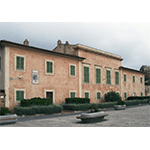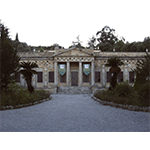Museo Nazionale delle Residenze Napoleoniche - Palazzina dei Mulini [National Museum of Napoleonic Residences - Palazzina dei Mulini]
Palazzina dei Mulini, adjacent to Fort Stella, was one of the residences occupied by Napoleon Bonaparte and his court during his exile on the Island of Elba. Its name, "Mulini" derives from the previous existence of mills, later converted into houses. On the facade is a beautiful sundial from 1825. The villa contains paintings and mementoes of the Emperor as well as some furniture, mainly in Empire style.
Especially interesting is Napoleon's Library, found in the residence. The first core of the library consisted of 186 volumes from the two libraries of Fontainebleau that Napoleon brought with him to Elba, to which were added the books of the local Military Engineers Corps and some works Napoleon had purchased for him by his uncle Cardinal Fesch with the money coming from the sale of iron extracted from the island’s mines. Today the Library consists of around 250 works remaining in the catalogue from the over 2,300 volumes that made up the original collection.
According to eighteenth-century French library regulations, the books in libraries were organised under five headings: theology and religion, law and jurisprudence, history, science and arts, and literature. The Napoleonic Library thus contains numerous works of scientific pertinence. Along with the Philosophie chimique and the Sistême des connaissances chimiques by Antoine François Fourcroy, the Théorie des fonctions analytiques by Joseph Louis Lagrange, the Exposition du système du monde and the Traité de mécanique céleste by Pierre Simon de Laplace, there are manuals on physiology, medicine, botany and mineralogy, treatises on the construction of mathematical instruments, on military techniques and on the preparation of textile dyes. Among the Italian titles are the Lezioni di agricoltura specialmente toscana by Ottaviano Targioni Tozzetti, the Elementi botanico-agrarj by Filippo Gallizioli and the Saggi di agricoltura pratica by Carlo Verri.
****************************
Texts by Anna Toscano
English translation by Catherine Frost
Last update 11/gen/2008





